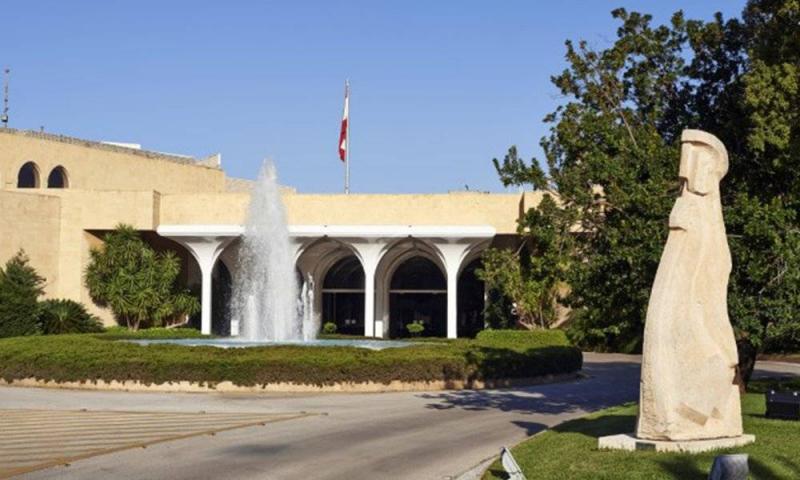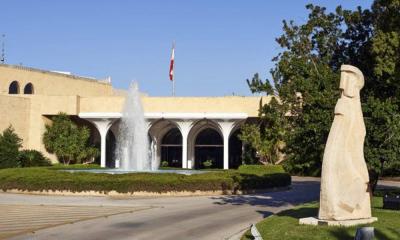As the world witnesses the latest developments in the negotiations surrounding the nuclear agreement with Iran, Lebanon stands out as one of the key arenas likely to be at the center of questions regarding the implications of this development on its reality, which has been fundamentally lacking in attractiveness since it "lost its political balance" with its regional connections. It was not insignificant that Hezbollah Secretary-General Hassan Nasrallah early on addressed the potential effects of returning to the nuclear agreement on two central issues that encapsulate the Lebanese scene these days: maritime delineation with Israel mediated by the U.S. and the presidential elections.
On Friday night, he affirmed that the “issue of maritime borders, Karish, oil, and gas has nothing to do with the Iranian nuclear agreement, neither closely nor remotely, whether a new agreement is signed or not. If the U.S. mediator comes and gives the Lebanese state what it demands - we are heading towards calm - whether the agreement is signed or not, and if the Lebanese state is not given what it demands, then we are heading towards escalation, and the eyes of the Lebanese must be on Karish and on the American mediator, who is still wasting time, and his time is running out.”
Informed circles interpreted Nasrallah’s statements as a careful attempt to “make everyone” outside Lebanon understand that the renewal of the nuclear agreement would not, in any case, alter the deterrence equation he has established against Israel and, by extension, Washington, regarding the extension of a deadline until next September to reach a delineation agreement that preserves all the rights defined by Lebanon's official stance and simultaneously releases operations for exploration and extraction across all Lebanese blocks.
Although the essence of the position also included signals reducing the area of the “minefield,” which could ignite a “sleeping front” between Lebanon and Israel, Nasrallah had previously defined all Israeli fields as “targets” within Hezbollah’s crosshairs, as long as Tel Aviv continues extracting from Karish and operates within its fields without reaching a delineation agreement and lifting what he termed as the “siege” on Lebanon’s oil wealth extraction.
However, during his appearance on Friday, he seemed to limit his “criterion of victory” in deterring the Israelis specifically at Karish, amid circumstances that do not encourage expectations for finalizing the delineation before the Israeli elections early next November, which coincide with the Lebanese presidential elections. This is amidst estimates that the party, which does not desire war, nor does Israel, has begun to “widen its elbow” towards making the disabling of “Karish” the banner for an “upcoming victory” in the transitional period leading up to reaching a maritime agreement, asserting that any aggression during this period will be met “with what is necessary.”
If the first dimension of the anticipated revitalization effects of the nuclear agreement was outlined by Hezbollah from “the beginning,” the second file linked to the Vienna negotiations, namely the presidential elections set to begin their constitutional deadlines in 10 days, appeared fraught with significant ambiguity. This stems from readings that suggest there is a “miscalculation” or an excess in approaching this entitlement and the identity of who will enter the presidential palace in Baabda through the lens of the Iranian nuclear issue, as if it would function as a “button” for releasing the autumn presidency and determining its orientations.
The circles argue that the domestic reality and its power balances will be the decisive criterion in the presidential elections, reminding that at critical junctures and intersections, the very wide margin that Hezbollah possesses to approach fundamental issues has been established. They recall that Tehran has previously expanded Hezbollah's “reference,” even if to emphasize the separation of tracks between the nuclear issue and the blazing arenas in the region, making it ultimately unrealistic to conceive that any revival of the nuclear agreement would have direct repercussions on the Lebanese presidency outside the party's vision, which so far adheres to three fundamentals:
First, not compromising the unity of the coalition it leads, which remains the essential support for the Lebanese situation despite losing the parliamentary majority, perhaps temporarily, if the leaks about potential accepted electoral challenges prove accurate and officially restore the majority “to its place.”
Second, not opposing the possibility that the next president is “acceptable” and capable of addressing the Americans and the Arab and international community at a critical moment amidst the dynamics of severe financial collapse.
Third, refusing the arrival of any confrontational or challenging president carrying hostile slogans or equations regarding “resistance,” its role, and its weaponry.
From here, regardless of all hints regarding the possibility of President Michel Aoun remaining in Baabda after his term expires, as long as a government with full powers has not been formed, which informed circles consider merely to be within the context of “psychological warfare” in the presidential arena, the rising likelihood of a presidential vacancy during the revival of the Iranian nuclear agreement will cement the increasing “Lebanese dimensions” of the presidential entitlement amid local complications that combine a negative balance in parliament, whereby neither Hezbollah nor its opponents possess the two-thirds quorum essential for providing the quorum for election sessions and electing a president, except from the second round onwards and with a majority of 65 votes, alongside Hezbollah's need to arrange its political house by securing agreements within its camp on one of two options: either a candidate from its ranks (with higher chances for Sleiman Frangieh compared to the almost non-existent prospects for Gibran Bassil) who will not be presented as a challenging president, with this task left to Parliament Speaker Nabih Berri to engineer such a path. Or a candidate from outside Hezbollah’s coalition, according to its known specifications and “no” clauses.
But in both cases, the presidential entitlement must not be “destructive” to the alliance that the party has built since 2005, which initially provided it with what resembled a “fire cover” for all its movements “both cold” and “hot,” and then allowed it to tighten its grip on the entire Lebanese situation from the 2016 presidency until the 2018 parliamentary elections.
From here, informed circles maintain that Hezbollah might find in the presidential void a mandatory passage to endorse a presidential option that obligates everyone, near and far, upon dangerous slips emanating from the financial reality that warns of further turmoil, recording the dollar at 34,000 Lebanese pounds yesterday, along with the chaos surrounding adjustments to collecting customs dollars. They pointed out that the party, which has yet to grant the “password” concerning the presidential file, could also benefit from the “action plan” it has formulated based on what its rivals will undertake; if they are unable to agree on a single candidate owning a numerical majority of 65, which seems difficult to envision, it may not require much effort to draw the majority of key players into... its field.




